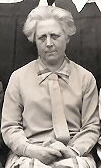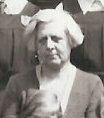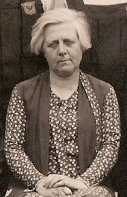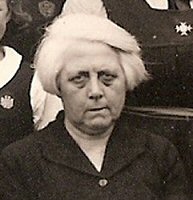Miss Baird's Retirement
This year brought us another sadness when we parted
with Miss Baird at the end of the Summer Term. Miss Baird
first joined the Staff in 1915 and so had served the
School for thirty-one years; during the last seventeen
years she acted as second mistress.
During all the time she was with us here Miss Baird
gave most devoted and generous service to the School and
its interests. She was always deeply concerned in the
girls and their welfare; their joys or their troubles,
small or great, were hers also this gift of hers of
entering into their lives and feelings caused her to be
loved by all. Her treatment of the, girls was marked by
justice and quiet understanding, and she was always most
anxious to be fair to everyone.
Above everything Miss Baird valued hard work,
especially the effort required from those who were not
particularly clever, to master the French language;
indeed, she had a ready sympathy for those who did their
upmost, although not particularly gifted with brains.
Many girls owe more than can be calculated to her
interest and genuine love for them.
For myself I cannot speak too highly of her organising
abilities, abilities which our school premises and the
extreme overcrowding of latter years taxed to the utmost,
but which were always equal to whatever the occasion
demanded. Miss Baird was indefatigable as well in her
teaching, and never flagged even after the many years
during which she had taught the same beginnings to so
many generations of girls.
The good-bye presents which Miss Baird received from
the Governors, the Staff: and pupils past and present
showed the esteem in which she was held, and the
gratitude she had so justly earned. We are glad that she
is still within easy visiting distance of School and that
living as she does in her delightful home at Bury St,
Edmunds, she can still keep in touch with us, and attend
our various school functions.
Miss Baird has given a precious gift to the School she
loved and served so well; she has endowed prizes to be
called after her, and to be awarded to girls who have
gained a high standard in French in the public
examinations, and as well, and how characteristic this
is, to girls who have made their best efforts, although
they may not have gained great success. These prizes were
awarded for the first time last year, and as each year
comes round with fresh awards, the name will remind us of
one for whom we feel love and great gratitude.
BERTHA TILLY
Tributes to Miss Baird.
When Miss Baird first came to us in 1915 I was in the
Senior School, and remember so well the stimulating
pleasure of her French lessons. She first taught many of
us the thrill of words; in lighter vein entertained us
with humorous, good-natured digs at our thick-headedness,
lamenting the very wooden nature of our “wooden
O” and later in Sixth form days, led us with her in
subtle analysis of the characters of our French set
books, or discussed with us ideas in the world of
abstract values just beginning to interest us.
By this time we realised her utter sincerity and
appreciated that she never talked down to us, though all
the time giving out to us from her own thought and
experience, wisdom and good counsel.
In 1934 when I joined the Staff, Miss Baird, now
Senior Mistress, was the one link with the School I had
left. Since then, privileged to work with her in the
close contact of the Staff-room, I have seen and known
her from a different angle.
I realised the fairness, which as girls we had
recognised and taken for granted, to spring from a
deep-rooted inflexible love of justice, in the exercise
of which she would take endless ungrudging trouble, so as
not only to be fair, but to be fair in a way that could
be recognised and understood by the people concerned.
I came to see also the understanding sympathy, so
carefully hidden under curt words and gruff voice, which,
with her fairness, was the secret of her influence. When
praise was honestly earned she gave it generously; when
blame was deserved no one in the Staff-room could inspire
such salutary awe, and effect such genuine penitence.
In her relations with the Staff the same qualities
appeared with a natural difference. We all knew and
valued the fairness which distributed so evenly the
inevitable extra jobs; the generosity which quietly did
so many of them before asking us at all; the quick
observation and sympathy which recognised the most
“willing horses” the selflessness which stood
aside from activities carrying the most obvious kudos and
apparently preferred the duller, less spectacular, but
most necessary jobs.
Though we may not always have reached them, her
standards set the tone in the Staff-room. All of us found
in her a rock of strength and security; a friend always
ready to counsel in difficulty; never too busy to
consider any reasonable request; one whose help was
bounded only by our need of it, and who was withal so
humble and free from self-seeking that any evidence of
the loyal affection she inspired moved her to surprise -
and gratitude.
The BR Baird prizes she has so generously established
preserve her name in its annals so long as the School
exists: we who know and love her, and the School she has
so generously served, will hold that name all our lives
in our hearts, associated with her ideals of justice,
faithful devotion to duty and most ungrudging service,
and can best express the gratitude we feel by translating
those ideals into practice in our own circle, wherever it
be.
DG DEFEW
Miss Baird worked at Ely High School every day, every
minute of every day she was there in what I think was to
her, her ministry of teaching. Because her work was a
ministry, a vocation with her, she was a sound teacher,
an interesting teacher, a fine teacher, sound because she
managed often against odds, to establish a firm
groundwork of the French language in almost all her
pupils; interesting because no pupil of hers really
disliked her subject and all liked her way of teaching;
fine because she imparted culture. Perhaps this last is
most important of all.
Like every good teacher, she did not merely impart
knowledge, certainly we all had to learn some French,
willy-nilly, but all the time that she was leading us
along the thorny path of French grammar, she was opening
in that way, other gates, gates that gave you glimpses of
the flowering meadows of literature, of music, of
pictures, of strange countries, encouraging us to get
thither if we could.
She wanted us to share her secret joys, the poetry of
Shakespeare, the beauty of flowers, the wonder of the
stars, the magic of tradition that lingers about old
buildings, These and others she indicated to us - I don't
quite know how but that is so. She did it often, shyly
and quite suddenly, but never conventionally.
There was a fascination, a curious charm in her
side-trackings. As French mistress she naturally led us
to our first early appreciation of Vigny, Musset, Balzac,
Flaubert, but she also persuaded in subtle manner, a
number of us to a taste for Jane Austen, to an
acquaintance with the names and positions of the
chief'constellations, to the learning and possessing of
some the jewels of English as well as French poetry.
Of course we might have discovered them later for
ourselves but how grateful one is to have a fascinating
guide in the years when the way needs to be pointed and
when the mind is open to the sheer delight of first
recognitions of beauty in literature and nature.
I don't think Miss Baird found us Fenland children
dull and boring to teach. Anyway she never showed it. She
never made anyone feel hopeless or stupid. I even think
she had more affection for the ones who found French
rather difficult. She always won their confidence and
affection. If we worked, really worked, she was satisfied
and a word of praise from her was eminently satisfying. I
remember her quoting more than once “L'homme qui
travaille n’est jamais ridicule.”
I think she is now enjoying to the full some her
secret treasures which she always wanted us to find too,
of reading, listening to music, gardening and soon I hope
the delight of travel of which she always spoke with
great anticipation, will be hers. We are grateful to her
for pointing us the way to them.
NINA AMBROSE
At the end of the Summer Term Miss Baird retired. This
was a great loss to the School, at which she had devoted
so many years in great service.
Miss Baird will be remembered by us all, for her great
powers of organisation. Not only during the hours of
school did she work, but even during the evenings,
weekends, arranging factors contributing to the smooth
running of the School. Her energy was immense and she
always seemed to place the School before herself. Such
great service will indeed he missed.
So many of us will remember very vividly how much Miss
Baird encouraged those girls who tried hard, not these
girls who found it ease to reach the top of the form, but
those of us, which found the subject difficult, but
despite this endeavoured to do our best in it. Miss Baird
always had a word of encouragement for these girls and
indeed we all greatly appreciated it.
A friend, that was what Miss Baird was to all of us,
on all occasions. Any little troubles, that came to her
ears, she always took steps to put right, and her great
interest in each individual pupil made us regard her as a
friend. Those of us, which had the good fortune and
honour to have lessons with her, will never forget the
little human touches she put into them, which made them
so interesting. Patience and understanding were always
evident in all that she undertook. Miss Baird's sense of
fairness too is one of her great qualities, which we will
retain in our thoughts of her.
In Miss Baird's retirement, we lose not only a great
teacher and helper, but we lose above all a friend. We
unite in wishing her health and happiness in her well
earned retirement.
JUNE MACDONALD
[There were also several unsigned expressions of
thanks and good wishes from Old Girls]

from an earlier as yet
undated School Photo |

from an earlier as yet
undated School Photo |

from the 1930 School Photo |

from the 1938 School Photo |
[Research suggests that Miss Bertha
Rose Baird was born in Bury St Edmunds in 1885 to James
and Marie Baird.]
page created 19 Sep 10: last updated 4 Nov 10
If you can add to this page please contact us




